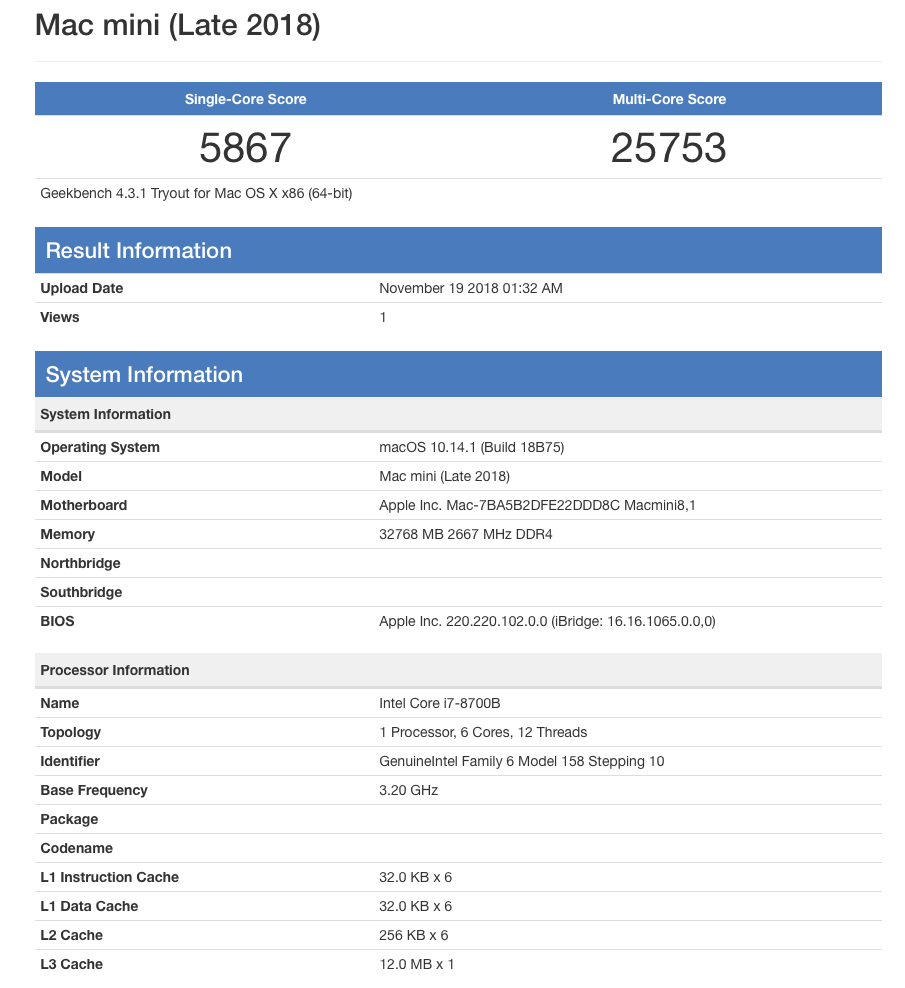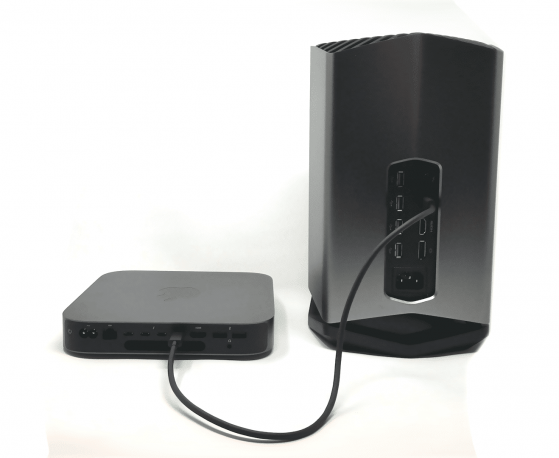

This was being used on MAC OSX as a Virtual machine (Parallels app).

Apple M1 chip is a successor of iPad’s A14Z chip and the first designed specifically for the Mac.
#Apple mac mini 2018 geekbench pro#
The Mac Studio comes in two varieties, one with the same M1 Max chip used in the 2021 MacBook Pro models and. Also, the A12Z is designed with an iPad Pro's internals in mind custom silicon for upcoming MacBooks and iMacs will have much more thermal headroom to flex its muscles.įor now though, this preliminary benchmark is only to be taken as a sign of things to come and they are no doubt encouraging.Rabbitmq mac m1. The availability of native ARM64 benchmarking apps, more faster chips such as the upcoming A14 Bionic, and further optimizations to macOS 11 should enable even better scores. Remember that we are only looking at an older SoC for now and that too, under emulation. These scores indicate immense potential for Apple's ARM transition. This implies that Apple's A12Z under emulation is not too far away from a mainstream MacBook Air, which is a good thing. Here, we see only about a 10.7% performance deficit in multi-core and about 28.6% in single-core. This device scores 1,167 points in single-core and 2,881 points in multi-core in Geekbench 5. The numbers make more sense when compared to a 2020 MacBook Air powered by a Core i5-1030NG7. The clock speed is also listed as 2.4 GHz instead of the A12Z's rated clock of 2.5 GHz.

It is very well possible that Rosetta 2 is seeing only the four high performance cores and not the efficiency ones.

The Geekbench 5 result reports the DTK as having only four cores while it is known that the A12Z has, in fact, eight CPU cores. Though the performance difference is large, the numbers are still good considering the fact that we are looking at emulation and early software. The A12Z in the DTK is about 25.4% slower in single-core and 45.2% slower in multi-core. The A12Z Bionic in the iPad Pro 12.9 scores about 1,117 and 4,712 in single and multi-core tests, respectively. Let's take native A12Z scores for comparison first. So, what do these preliminary numbers indicate? It must be noted here that since Geekbench does not have a native Apple Silicon version yet, the available scores are under a Rosetta 2 emulation. There are about eight total entries for this particular machine in the Geekbench 5 database. The DTK seems to have achieved a single-core score of 833 and a multi-core score of 2,582. The Apple DTK is essentially a Mac Mini powered by the A12Z Bionic SoC and running macOS 11 Big Sur Developer Beta. Now, several Geekbench 5 benchmarks have now leaked despite the use of the DTK being governed by a non-disclosure agreement (NDA). Apple also made available a Developer Transition Kit (DTK) to enable developers to get started with creating apps that run on macOS 11 Big Sur powered by Apple Silicon. 3D Printing, 5G, Accessory, AI, Alder Lake, AMD, Android, Apple, ARM, Audio, Benchmark, Biotech, Business, Camera, Cannon Lake, Cezanne (Zen 3), Charts, Chinese Tech, Chromebook, Coffee Lake, Comet Lake, Console, Convertible / 2-in-1, Cryptocurrency, Cyberlaw, Deal, Desktop, E-Mobility, Education, Exclusive, Fail, Foldable, Gadget, Galaxy Note, Galaxy S, Gamecheck, Gaming, Geforce, Google Pixel, GPU, How To, Ice Lake, Intel, Intel Evo, Internet of Things (IoT), iOS, iPad, iPad Pro, iPhone, Jasper Lake, Lakefield, Laptop, Launch, Leaks / Rumors, Linux / Unix, List, Lucienne (Zen 2), MacBook, Mini PC, Monitor, MSI, OnePlus, Opinion, Phablet, Radeon, Raptor Lake, Renoir, Review Snippet, Rocket Lake, Ryzen (Zen), Science, Security, Single-Board Computer (SBC), Smart Home, Smartphone, Smartwatch, Software, Storage, Tablet, ThinkPad, Thunderbolt, Tiger Lake, Touchscreen, Ultrabook, Virtual Reality (VR) / Augmented Reality (AR), Wearable, Wi-Fi 7, Windows, Workstation, XPS, Zen 3 (Vermeer), Zen 4Īpple announced the transition to ARM at this year's WWDC and the move has been largely welcomed given its potential for seamless computing across mobile and desktop.


 0 kommentar(er)
0 kommentar(er)
